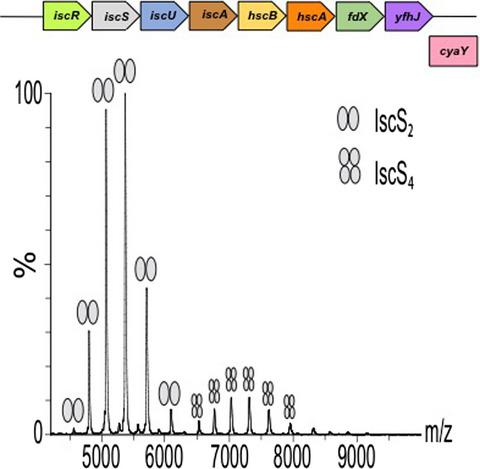Our official English website, www.x-mol.net, welcomes your feedback! (Note: you will need to create a separate account there.)
A Guide to Native Mass Spectrometry to determine complex interactomes of molecular machines.
The FEBS Journal ( IF 5.4 ) Pub Date : 2020-03-06 , DOI: 10.1111/febs.15281 Rita Puglisi 1 , Elisabetta Boeri Erba 2 , Annalisa Pastore 1
The FEBS Journal ( IF 5.4 ) Pub Date : 2020-03-06 , DOI: 10.1111/febs.15281 Rita Puglisi 1 , Elisabetta Boeri Erba 2 , Annalisa Pastore 1
Affiliation

|
Native mass spectrometry is an emerging technique in biology that gives the possibility to study noncovalently bound complexes with high sensitivity and accuracy. It thus allows the characterization of macromolecular assemblies, assessing their mass and stoichiometries and mapping the interacting surfaces. In this review, we discuss the application of native mass spectrometry to dynamic molecular machines based on multiple weak interactions. In the study of these machines, it is crucial to understand which and under which conditions various complexes form at any time point. We focus on the specific example of the iron–sulfur cluster biogenesis machine because this is an archetype of a dynamic machine that requires very specific and demanding experimental conditions, such as anaerobicity and the need of retaining the fold of marginally folded proteins. We describe the advantages, challenges and current limitations of the technique by providing examples from our own experience and suggesting possible future solutions.
中文翻译:

确定分子机器复杂相互作用组的原生质谱指南。
原生质谱法是生物学中的一项新兴技术,它提供了以高灵敏度和准确度研究非共价结合复合物的可能性。因此,它允许表征大分子组件,评估它们的质量和化学计量并绘制相互作用的表面。在这篇综述中,我们讨论了原生质谱在基于多重弱相互作用的动态分子机器中的应用。在研究这些机器时,了解在任何时间点形成各种复合物的条件和条件至关重要。我们专注于铁硫簇生物发生机器的具体例子,因为这是一个动态机器的原型,需要非常具体和苛刻的实验条件,例如厌氧性和需要保留边缘折叠蛋白质的折叠。我们通过提供来自我们自己的经验的示例并提出未来可能的解决方案来描述该技术的优势、挑战和当前的局限性。
更新日期:2020-03-06
中文翻译:

确定分子机器复杂相互作用组的原生质谱指南。
原生质谱法是生物学中的一项新兴技术,它提供了以高灵敏度和准确度研究非共价结合复合物的可能性。因此,它允许表征大分子组件,评估它们的质量和化学计量并绘制相互作用的表面。在这篇综述中,我们讨论了原生质谱在基于多重弱相互作用的动态分子机器中的应用。在研究这些机器时,了解在任何时间点形成各种复合物的条件和条件至关重要。我们专注于铁硫簇生物发生机器的具体例子,因为这是一个动态机器的原型,需要非常具体和苛刻的实验条件,例如厌氧性和需要保留边缘折叠蛋白质的折叠。我们通过提供来自我们自己的经验的示例并提出未来可能的解决方案来描述该技术的优势、挑战和当前的局限性。



























 京公网安备 11010802027423号
京公网安备 11010802027423号